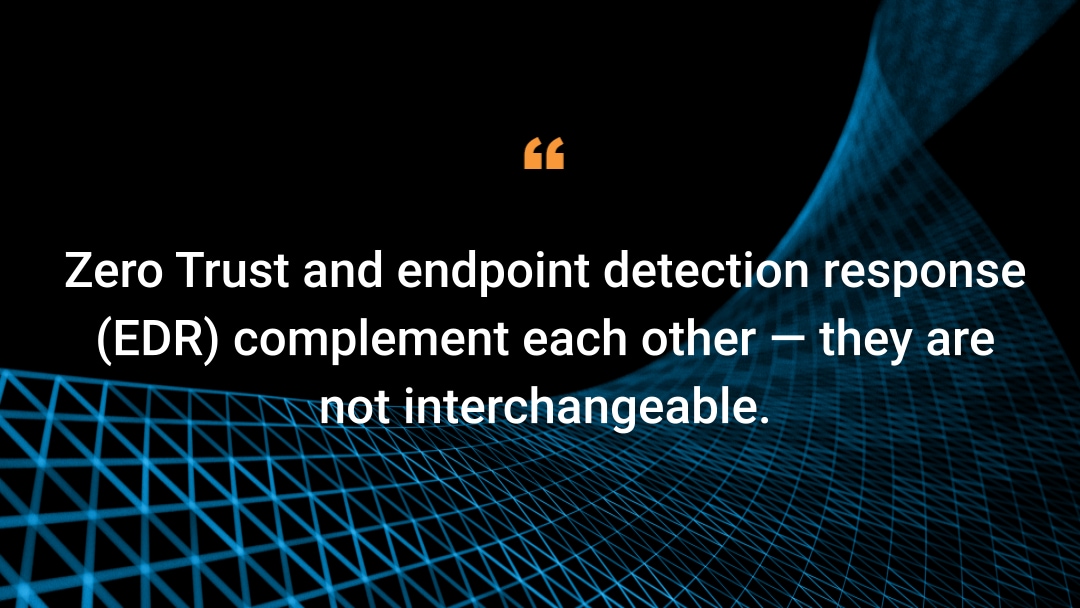Why Do I Need Zero Trust on My Endpoint If I Have EDR/XDR?

People often ask, “Why do I need a Zero Trust solution if I have EDR/XDR installed?” The short answer is you need both. Zero Trust and endpoint detection response (EDR) complement each other — they are not interchangeable. Together they provide the most powerful defense against ransomware and other cybersecurity attacks.
EDR/XDR is half the solution
I understand the confusion. Over the past few years, extended detection and response (XDR) products have taken EDR beyond the endpoint-centric view of threats with more robust capabilities. While EDR provides protection against endpoint attacks based on data analyzed from endpoints alone, XDR products correlate data from additional network sources, including cloud workloads, network traffic, servers, and so forth to provide security teams with a richer dataset for analyzing threats.
However, although XDR products provide a broader view of the network activity than EDR products, their focus is still on detection and response. EDR and XDR define what’s bad and stop it, but a Zero Trust solution defines what’s good and keeps everything else out. Neither EDR nor XDR provides the entire scope of defenses provided by a true Zero Trust solution.
True Zero Trust is the other half
And what do I mean by a true Zero Trust solution? I’m referring to a holistic solution that allows businesses to deal with two of the most burning problems of our turbulent times — a distributed workforce and ransomware attacks.
Given the magnitude of ransomware attacks and the prevalence of remote work, organizations are looking to complement their EDR solutions to ensure attacks don’t spread across their network and take out huge fleets of laptops. And with the proliferation of zero-day vulnerabilities and obfuscation techniques, it’s nearly impossible to detect every malicious activity.
EDR/XDR solutions alone cannot reduce attack surfaces and block the lateral movement of ransomware and other cybersecurity attacks.
The attacks you hear about are often those missed by EDR/XDR
EDR tools are used mainly to detect malicious behavior within a protected network asset. But what happens if their logic fails? If a threat manages to evade detection? In that case your network is completely vulnerable. And this is where Zero Trust microsegmentation comes into play.
When EDR doesn’t help and you get infected, Zero Trust gives you segmentation that helps mitigate the infection and reduce the attack surface. With Zero Trust microsegmentation, you can instantly detect never-before-seen threats. Endpoint security will stop many attacks, but when it comes to never-before-seen ransomware or malware, security tools such as EDR need time to recognize a file as malicious, leaving the organization exposed to vulnerabilities.
Comprehensive security
Regardless of which EDR or XDR solution you choose to deploy, you still need a fast and scalable way to control user and device access and to segment endpoints to prevent lateral movement. Akamai provides a holistic Zero Trust solution that complements EDR/XDR and provides your organization with the most robust defense. The solution can be extended to servers, endpoints, and all network-connected devices.
Powerful together: Zero Trust plus EDR/XDR
EDR and Zero Trust play different roles in cybersecurity. EDR/XDR products detect suspicious activity on an endpoint and respond to it by either sending an alert or enabling you to manually remediate the infected machines. Zero Trust products are built to reduce a network’s attack surface, eliminating any implicit trust of any user or device.
Without implicit trust, breach propagation will not be possible. Even if the malware manages to infect an endpoint, the Zero Trust microsegmentation will block its ability to communicate with other devices, ensuring the first compromised endpoint is also the last.


